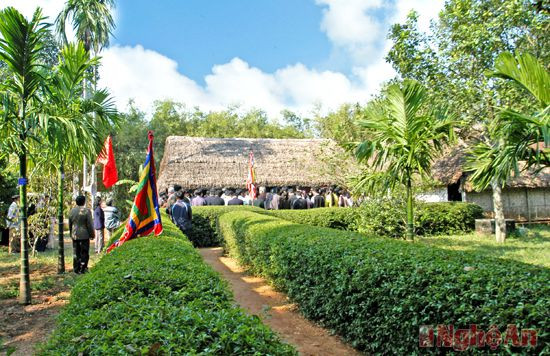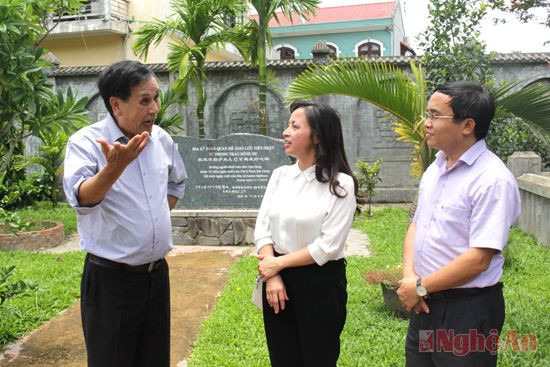Phan Boi Chau - The man who carries the soul of the country
(Baonghean) - In the late 19th century, the Can Vuong movement was severely suppressed by the French colonialists and their henchmen and ended in failure.
The Vietnamese people groaned under two layers of oppression and exploitation, their already miserable lives became even darker. In that context, the history of the nation posed an extremely urgent and harsh demand for the patriots at that time, which was to find a way and path to save the country in accordance with historical requirements, continuing the tradition of saving the country and liberating the nation of their ancestors. It was at that moment that Phan Boi Chau appeared as a savior, creating faith, light, and a new ray of hope for 20 million Vietnamese people who were occupied under the harsh colonial regime. As Nguyen Ai Quoc respectfully commented: "Phan Boi Chau - a hero, an angel, a person who sacrificed himself for independence, was revered by 20 million people in slavery". Cultural researcher Dang Thai Mai once wrote: “Just because of reading Phan Boi Chau, thousands of young men cut off their braids, threw away all their books, literature, and the humiliating dream of fame attached to them, left their villages, homes, wives and children, crossed thousands of rivers, disregarded all the hunger, danger, and hardship to go to Siam, China, and Japan to study and plan to fight the French. That was a great success.”
 |
| Phan Boi Chau Memorial House in Nam Dan. Photo: Sy Minh |
Phan Boi Chau's real name is Phan Van San, also known as Hai Thu, later taking the name Sao Nam, he was born in 1867 in Dan Nhiem village, Xuan Hoa commune, Nam Dan district (Nghe An). Born into a family of Confucian scholars, Phan Van San was famous throughout the region for his intelligence. With his innate talent but born in a country of hard work, war, and poverty, Phan Van San chose to teach to make a living. He also pursued the path of mandarin examinations but seemed to have realized the backwardness and obsolescence of the education system at that time. In 1898, after being wrongly convicted of "hoai hiep van tu" for bringing documents into the examination hall and being sentenced to "Chung mau bat dac ung thi" (for life not allowed to take the exam), Phan Van San packed his bags and went to Hue. In the capital, he had the opportunity to meet and make friends with famous scholars and high-ranking officials holding important positions in the capital. Phan's talent quickly became known to many people in Hue and he became close friends with like-minded people such as Phan Chu Trinh, Nguyen Thuong Hien, Dang Nguyen Can, Huynh Thuc Khang, Tran Quy Cap... Also in the capital Hue, with the help of friends, Phan Van San's "hoai hiep van tu" injustice was resolved. In 1900, he returned to his hometown Nghe An and took part in the regional exam. At this exam, he passed the exam with the praise "A name famous in the literary world" and from here Phan Van San "had a false reputation to cover the eyes of the world" - as he said. This was also the time when he entered a life of patriotic activities full of excitement and storms under the name Phan Boi Chau.
 |
| Mr. Phan Thieu Cat (grandson of Phan Boi Chau) talks with former students of Phan School at Phan Boi Chau Memorial Site in Hue City. Photo: D.T |
In 1904, Phan Boi Chau, together with Nguyen Ham and some others, founded Duy Tan Association, choosing Ky Ngoai Hau Cuong De - Nguyen Phuc Dan, a descendant of the Nguyen Dynasty, as the head of the association. In 1905, he, along with Dang Tu Kinh and Tang Bat Ho, went to China and then to Japan with the aim of asking Japan to help Duy Tan Association expel the French. During this period, Phan Boi Chau wrote the book "History of Vietnam's Lost Country" to awaken the patriotism of the people and began to form a path to send young people abroad to study in order to return to save the country. Through the Dong Du movement, from 1905 to 1908, Phan Boi Chau and like-minded people sent about 200 outstanding young Vietnamese people to Japan to study with the hope that they would become the core for the movement to save the country and liberate the nation later. In September 1908, after the anti-tax movement broke out in the Central region and spread to other provinces, the French colonialists severely suppressed it, many Duy Tan members were arrested and sentenced, among them was the patriot Nguyen Ham - a core member of the movement. Then, with the compromise of the French protectorate government and the Japanese government, the students following the Dong Du movement were expelled from Japan, ending an important activity that Phan Boi Chau and his colleagues had worked hard to build.
In June 1912, Phan Boi Chau chaired the "Great Conference" in Guangzhou (China) and decided to dissolve the Duy Tan Association and establish a new Vietnam Restoration Association. With this policy, Phan Boi Chau changed the fighting principle from monarchism to democracy to expel the French army, aiming to establish the Republic of Vietnam, responding to the new changes in the international arena. After the establishment of the Vietnam Restoration Association, Phan Boi Chau sent a number of people back to the country to eliminate a number of enemies, re-igniting the patriotic movement among the masses. Considering Phan Boi Chau as the mastermind, the French colonialists and their puppet government sentenced him to death in absentia. In 1913, the French protectorate government colluded with the governor of Guangdong (China) to arrest Phan Boi Chau and he was imprisoned in Guangdong prison until February 1917 before being released. After being released from prison, Phan Van San continued his revolutionary activities. In 1922, studying Sun Yat-sen's policies in China, Phan Boi Chau intended to reform the Vietnam Restoration Association into the Vietnamese Nationalist Party, but before he could reform, he was kidnapped on June 30, 1925.
With the ambition of "eradicating the roots" and preventing the revolutionary movement under the influence of Phan Van San, the French colonialists decided to secretly destroy and eliminate this leader. The plot was exposed and at this time the Vietnamese people, especially the patriotic intellectual youth, raised a strong movement to demand that the French colonialists release Mr. Phan. The movement also spread to China and Paris. Under pressure from the revolutionary masses, the French colonialists were forced to abolish the life sentence for Mr. Phan. And from 1925 to 1940, Mr. Phan Boi Chau was imprisoned in Hue and became "Old Man Ben Ngu" - the closest and most respectful way of calling by the people in the homeland of Ngu Mountain and Huong River.
In his journey to fulfill his mission of saving the country, Phan Boi Chau, from the Nghe An native, soon became the most brilliant representative of the patriotic scholars and mandarins of Vietnam in the early 20th century. Phan Boi Chau had a journey across borders to many regions of East Asia and Southeast Asia, quickly overcoming all the narrow limits of locality and country, to turn patriotism into national pride. In his autobiography, Sao Nam was very humble about himself when he said: "Alas! So many years of wandering, planning hundreds of things but not achieving anything, thinking that I have made many mistakes, many sins..." or: "Alas! My history is a history of a hundred failures without a single success". However, from Phan Boi Chau's "failure to achieve anything" has lit the way for the next generations to find extremely valuable practical experience and from here the path to saving the country and liberating the nation has become the clearest. These are extremely important experiences and premises for the next generations to inherit and develop successfully. The most typical of these is none other than Nguyen Ai Quoc – Ho Chi Minh.
In the great personality of Phan Boi Chau, there is a close combination of the two aspects of politics and culture. Before becoming the leader of the Duy Tan movement and the organization of the Vietnam Restoration Association, Phan Van San was famous throughout the country for his talent in Chinese studies. When he became a revolutionary, Phan had a parallel development between his political personality and his cultural personality. From 1925 to the last years of his life under French colonial control in Hue, although he did not directly participate in the fight against the enemy, Phan continued his career with a pen capable of turning thunder and lightning into current events. In the situation of "fish in a bowl, birds in a cage", there was a generation of people who were deeply moved by Phan's words: "Casting an iron liver to move mountains and fill seas/ Pouring hot blood to wash away the stain of slavery". In Phan Boi Chau's thinking, the youth class is the core that plays a decisive role in the fate of the country. He wrote: “Because of young people, a young country is eternally young. Because of young people, a young country is extremely prestigious! To be exact, young people are the soul of a young country.”
For 15 years living in the capital, "Old Man Ben Ngu" lived simply in a thatched house and never stopped yearning for his homeland and country. There, in a narrow courtyard in the middle of the capital, people saw the image of a well, rows of areca trees, and rows of tombstones that Mr. Phan had built to worship his comrades who had fallen for the country. When his strength was exhausted, he exclaimed: "To save the country and preserve the race, I have the will but not the talent. Now I bid farewell to the nation forever. My sins are great, I hope the nation will forgive me." Just that much is enough to see the heart of a son for his fatherland. Phan Boi Chau is forever "one of the most beautiful Vietnamese people" as assessed by writer and literary researcher Hoai Thanh.
In the minds of the Vietnamese people in general and Nghe An in particular, Phan Van San - Phan Boi Chau is forever a shining example of revolutionary qualities, a typical representative of the personality and spirit of the nation. To express gratitude and educate generations of descendants, this year, commemorating the 75th anniversary of Phan Boi Chau's death, the Provincial Party Committee and People's Committee of Nghe An province have agreed to approve the Project to adjust the planning of the Phan Boi Chau Memorial Site in Nam Dan Town (Nghe An) to be more worthy of his life, career and stature. In particular, the project was built with the extremely meaningful contributions of generations of former students of the school named after Phan Boi Chau in Nghe An. Within just 4 months after launching, more than 500 former students of Phan Boi Chau school participated in supporting with a total amount of nearly 1.7 billion VND. The project is a profound and meaningful continuation of the morality of remembering the source of water, of the faith and gratitude of today's generation for revolutionary predecessors, of which Phan Boi Chau is a shining example.
Hoang Thi Quynh Anh,Deputy Director of Department of Culture, Sports and Tourism
| RELATED NEWS |
|---|






